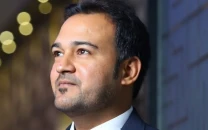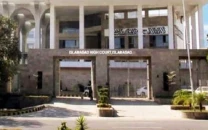In Pakistan, lack of trained speech therapists feeding quackery
Prevalence of speech disorders significantly high in Pakistan, experts say

PHOTO: FILE
This was suggested by the Dr Nazia Mumtaz, the inaugural president of the Pakistan Speech and Language Pathologist Association (PSLPA) which was launched in the federal capital on Sunday. The association aims to increase awareness about speech, hearing and communication disorders and to help treat and rehabilitate individuals suffering from such disorders.
National Health Services Federal Parliamentary Secretary Dr Nausheen Hamid, while addressing the launching ceremony said that the incumbent government has already embarked upon the Sehat Sahulat Programme — national health insurance programme — where people suffering from all kinds of ailments and disabilities and their families will be given health cards on priority.
"The government is committed to providing quality and affordable health care services to the citizens of the country and to improve their standards of living and social wellbeing," she said, adding that there is a pressing need to deviate from past practices and to actively identify and treat individuals suffering from any disability as recognised by the World Health Organisation (WHO).
Dr Hamid reiterated that her government is determined to eliminate quackery in the medical and allied health professions, and will ensure standardisation of healthcare education and accreditation of related educational institutions.
She said the government is also making efforts to ensure access to basic health and education facilities for all, which, they hope, helps the country achieve Sustainable Development Goals (SDGs).
PSLPA President Dr Nazia Mumtaz said the prevalence of speech, communication and hearing disorders is significantly high in our society.
"Unfortunately, a sufficient number of trained and qualified Speech and Language Pathologists (SLP/T's) are not available in the country," she lamented, adding that speech and language therapy enables individuals suffering from such disabilities to help make them productive citizens of the state and improve their quality of life.
Dr Mumtaz further said that PSLPA aims to raise public awareness regarding the profession of Speech and Language Pathology (SLP) and to provide a platform, where SLP specialists share best international practices and clinical guidelines, latest national and international research and suggest proposals for establishing a regulatory framework for the profession.
“There is a dire need to eliminate quackery in this profession and a need for a standardised curriculum as well as accreditation of educational and research institutions through the necessary regulatory regime,” she stressed.
Dr Mumtaz said that SLP is an emerging yet rapidly spreading allied health discipline in Pakistan and internationally.
"Through mainstreaming and inclusive education the social and economic burden of individuals suffering from speech, hearing and communication disorders is likely to be reduced on the state, community and the family," she said, adding that Pakistan is a signatory to international treaties and conventions where the right to inclusive education is recognised with a focus on the need for governments to ensure equal access to an "inclusive education system at all levels" and ensure equitable accommodation and individual support services to people with special need.
Sustainable Development Policy Institute (SDPI) Executive Director Dr Abid Qaiyum Suleri said speech therapy remains an ignored field in Pakistan's healthcare system.
"It is essential that along with creating awareness, the launch of public sector development projects in this domain would not only provide affordable and quality rehabilitative services but also generate employment opportunities for fresh graduates," he said, adding that efforts of PSLPA for taking the lead with this initiative to raise awareness are commendable.
The launch ceremony was attended by the policymakers, health professionals, academia, speech-language pathologists and speech therapists.
Published in The Express Tribune, October 21st, 2019.



















COMMENTS
Comments are moderated and generally will be posted if they are on-topic and not abusive.
For more information, please see our Comments FAQ